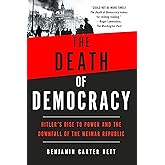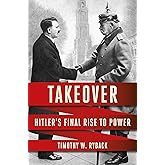
Download the free Kindle app and start reading Kindle books instantly on your smartphone, tablet, or computer - no Kindle device required.
Read instantly on your browser with Kindle for Web.
Using your mobile phone camera - scan the code below and download the Kindle app.

OK
 Audible sample Sample
Audible sample Sample 


The Weimar Years: Rise and Fall 1918–1933 Hardcover – September 10, 2024

Explore your book, then jump right back to where you left off with Page Flip.
View high quality images that let you zoom in to take a closer look.
Enjoy features only possible in digital – start reading right away, carry your library with you, adjust the font, create shareable notes and highlights, and more.
Discover additional details about the events, people, and places in your book, with Wikipedia integration.
A DAILY MAIL BOOK OF THE WEEK
A SPECTATOR BOOK OF THE YEAR
A DAILY TELEGRAPH BEST HISTORY BOOK OF 2023
ASPECTS OF HISTORY BOOKS OF THE YEAR
A GUARDIAN BOOK OF THE YEAR 2023
A DAILY MAIL BEST CHRISTMAS BOOK OF 2023
Established in 1918–19, in the wake of Germany's catastrophic defeat in the First World War and the revolution that followed swiftly on its heels, the Weimar Republic ushered in widespread social reform, a radical cultural flowering and the most democratic conditions the German people had ever known.
At its beginning, Weimar held out the hope that democracy, stability and prosperity would take root in Germany, but it was beset by frequent changes of government, waves of economic upheaval and spasms of violence of increasing intensity between the forces of left and right. Agitation and assassination by rightwing nationalists – enraged by the severity of the Treaty of Versailles and the acceptance of its terms by liberal German politicians – formed a threatening descant to the conciliatory efforts of successive coalition governments. Ultimately, the instabilities of Weimar would lead to the appointment as German Chancellor of the Nazi Fu¨hrer Adolf Hitler, who created a one-party dictatorship that abandoned the rule of law, democracy and civil rights. In the words of Gustav Stresemann, Germany's Nobel Peace Prize-winning Foreign Minister from 1923 to 1929, Weimar democracy was 'dancing on a volcano'.
The Weimar Years is a vivid and compelling narrative of a dramatic period in German history. Year by year, from 1918 to 1933, Frank McDonough covers the major events in both domestic and foreign policy and the personalities who shaped them, together with developments in music, art, theatre and literature. McDonough places particular focus on the parliamentary history of Weimar, arguing that it was the failure of parliamentary democracy to bring stability that eroded public confidence and allowed the power of the elected Reichstag to gradually diminish, culminating in Hitler's accession to power in January 1933.
The Weimar Years is the tragic story of a rise and fall, as well as a warning of how, under poor leadership, economic pressure and unrelenting political volatility, a democracy can drift towards a form of authoritarian rule that eventually destroys it.
- Print length592 pages
- LanguageEnglish
- PublisherApollo
- Publication dateSeptember 10, 2024
- Dimensions6.14 x 1.95 x 9.21 inches
- ISBN-101803284781
- ISBN-13978-1803284781
The Amazon Book Review
Book recommendations, author interviews, editors' picks, and more. Read it now.
Frequently bought together

Similar items that may ship from close to you
Editorial Reviews
Review
“Astonishing. A masterful account of the Weimar Republic that is the best I have ever read – and one that is destined to be a classic. An extraordinary achievement.” ―Peter Frankopan
“Magisterial, terrifyingly relevant and yet also a celebration of Weimar's delicious decadence: Frank McDonough's new Weimar Years, the latest in his outstanding series on Nazi rule and how it happened, combines scholarly research, narrative brio and lucid analysis in a work that enjoys the creativity and libertinism of Weimar - while chronicling its flaws and its rising darkness.” ―Simon Sebag Montefiore
“Yet again McDonough shows why he is one of the best chroniclers of 20th century Germany. This excellent book completes the set. Alongside his other volumes he now tells the whole story of Germany from one World War defeat to another. A giant achievement.” ―Dan Snow
“Frank McDonough has done it again. This authoritative guide to the fractured Weimar Republic is both well-considered and immensely readable. Superb.” ―Clare Mulley, author of The Women Who Flew For Hitler
“Written with an easy style which belies its author's erudition, The Weimar Years is a masterpiece of narrative history - and a poignant lesson in how democracy can fail.” ―Roger Moorhouse
“[A] brilliant new book... shows with terrifying clarity that everything in global politics connects” ―Daily Mail
“[A] timely book, delivering a stark reminder of what happens when democratic foundations become eroded by social division and political apathy.” ―The Spectator
“[McDonough] expertly guides the reader through the complex and heady events that led to the rise of Nazi Germany. This is compelling history writ large but with a judicious eye for detail” ―History of War magazine
“Quite simply, a book that must be read” ―Get History
“PRAISE FOR FRANK McDONOUGH:
'A masterclass in the history of Nazi Germany, with an internationally renowned expert as the teacher' Get History.
'What makes this volume really stand out is its stylish design and more than 80 coloured photographs, punctuating the account of Hitler's slow but inevitable march to war' Military History.
'An impressive tome, beautifully presented with a body of illustrations... It is as readable as it is authoritative. Rarely has the odious story of the Third Reich been so elegantly presented' History Today.
'I have read many books on the period and Frank McDonough's ranks above them all. Bravo' Danny Baker.
'McDonough writes clearly and readably with just enough detail on the huge canvas that he covers'” ―Spectator
“Best History Books of 2023: depicts, with a fine narrative touch, this era as one of decadence and cultural and social experiment” ―Daily Telegraph
“Observer Best Books for Christmas 2023” ―The Observer
“a sparkling if unsettling account of the years after the end of the first world war, which were marked by economic desperation and repeated false dawns before the terrible reality of Hitler's ascent to power.” ―Peter Frankopan, The Guardian online
About the Author
Professor Frank McDonough is an internationally renowned expert on the Third Reich. He studied history at Balliol College, Oxford and gained a PhD from Lancaster University. Now based in Liverpool, McDonough has written many critically acclaimed books, including The Gestapo, Sophie Scholl and most recently The Hitler Years, a two-volume history charting the rise and fall of the Nazi regime.
Professor Frank McDonough is an internationally renowned expert on the Third Reich. He studied history at Balliol College, Oxford and gained a PhD from Lancaster University. Now based in Liverpool, McDonough has written many critically acclaimed books, including The Gestapo, Sophie Scholl and most recently The Hitler Years, a two-volume history charting the rise and fall of the Nazi regime.
Product details
- Publisher : Apollo (September 10, 2024)
- Language : English
- Hardcover : 592 pages
- ISBN-10 : 1803284781
- ISBN-13 : 978-1803284781
- Item Weight : 2.33 pounds
- Dimensions : 6.14 x 1.95 x 9.21 inches
- Best Sellers Rank: #333,482 in Books (See Top 100 in Books)
- #382 in World War I History (Books)
- #649 in German History (Books)
- #2,870 in World War II History (Books)
- Customer Reviews:
About the author

Professor Frank McDonough is an internationally renowned expert on the Third Reich. He studied history at Balliol College, Oxford and gained a PhD from Lancaster University.
He has written many critically acclaimed books on the Third Reich, including: The Gestapo (2015), Hitler and the Rise of the Nazi Party (2012), Sophie Scholl: The Woman Who Defied Hitler (2009), The Holocaust (2008), Opposition and Resistance in Nazi Germany (2001), Hitler, Chamberlain and Appeasement (2002), and Hitler and Nazi Germany (1999). More recently, Frank has completed a best selling trilogy on Germany history from 1918 to 1945 with two volumes on the period when Hitler ruled Germany called The Hitler Years and the period when he rose to power called The Weimar Years.
Customer reviews
Customer Reviews, including Product Star Ratings help customers to learn more about the product and decide whether it is the right product for them.
To calculate the overall star rating and percentage breakdown by star, we don’t use a simple average. Instead, our system considers things like how recent a review is and if the reviewer bought the item on Amazon. It also analyzed reviews to verify trustworthiness.
Learn more how customers reviews work on Amazon-
Top reviews
Top reviews from the United States
There was a problem filtering reviews right now. Please try again later.
Third Reich historian Frank McDonough has written a year-by-year tick tock history of the Weimar Republic from its founding in 1918 to its demise on January 30, 1933. It is largely a political history where he sometimes goes into excruciating detail about the various cabinet changes over the years. His hero is Gustav Stresemann, prime minister and for many years foreign minister. He was perhaps Germany’s most influential politician from 1925 -1929 where he negotiated a détente with the West though the Locarno Treaty. Unfortunately, deliberate, or not there was not Locarno for the East where Stresemann had designs on the eastern territories taken away from Germany at Versailles.
McDonough rightly notes that the premature deaths of Foreign Minister Walter Rathenau by assassination in 1922 and the deaths by disease of President Friedrich Ebert and Stresemann severely eroded the talent of the regime. I have written elsewhere that Stresemann’s death in 1929 removed the last politician of stature who could have stood up to Hitler.
Weimar was plagued from the beginning by a flawed constitution and its lack of legitimacy among the German Right. The two fundamental flaws in the constitution were proportional representation that allowed for the smallest of parties to have a voice in Reichstag and Article 48 which enabled the president to rule by decree. That would haunt the government as the economic crisis of the 1930’s hit.
Further, it was this government that signed the Versailles Treaty that established Germany’s sole guilt in starting World War I and placed a severe reparations burden on the economy. It was a tough start and that along with crippling inflation almost brought the government down. However, as Robert Gerwath noted in “November 1918: The Great Revolution” Weimar survived and with Dawes Plan loans in 1925 actually prospered.
So why did Weimar collapse? To McDonough the faults lie with the lack of responsible parties on the Right and with President Paul von Hindenburg, the hero of World War I, who in the late 1920’s was supportive of the government, returned to his monarchal roots as a Prussian land baron. It was he, along with the intrigues of Franz von Papen and Kurt von Schleicher who brought down the hapless Heinrich Bruning government in 1932. Bruning’s government was imposed on the Reichstag by Hindenburg. He never had a parliamentary majority and with the lack of foreign currency reserves he was forced to impose a draconian austerity policy on an economy already in depression. To me Bruning did not have much of a choice. By the way, the best tick-tock on the end of Weimar is in Rudiger Barth’s and Hauke Friedrichs’ “The Last Winter of the Weimar Republic.”
Indeed, the decay was evident in December 1930 when Nazi goons disrupted the German premier of the anti-war film, “All Quiet on the Western Front.” So great were their disruptions that the film was banned a week after the failed premier. This has a familiar ring today in America where pro-Palestine mobs are canceling Jewish performers and Israeli officials.
Away from politics McDonough discusses the flowering of culture in art (abstract expressionism), architecture (Bauhaus), and film (Metropolis). Indeed, Berlin was second only to Hollywood in film production in the 1920’s. There was also the very free and licentious culture of Berlin’s nightclub scene. It was not for nothing that the recent German TV series was called “Babylon Berlin.” What McDonough does not mention is that this Avant Garde culture just might have turned off small city and rural Germany who overwhelmingly voted for Hitler in 1932.
However, my two primary concerns with McDonough’s otherwise excellent work is that he down plays economics. He should have taken seriously the works of Frederick Taylor’s “The Downfall of Money,” and Tobias Straumann’s “1931: Debt Crisis and the Rise of Hitler.” Simply put, Weimar was not up to the task. However, to his credit, McDonough does not that Hitler’s opposition to the Young Plan in 1930 made him respectable.
My second concern is that he failed to emphasize the long-standing division in the Left between the Socialists and the Communists. The split started during World War I and was exacerbated by the Socialist government with the support of the Army and the Free Corps in putting down the communist Spartacist Revolt in early 1920. Later in 1929 a different socialist government put down the “Bloody May” communist demonstration in 1929. McDonough doesn’t even mention this and with the communists calling the socialists “social fascists” it less of a surprise seeing them join forces with the Nazis in bringing down the Bruning government and in supporting a transit strike in Berlin in late 1932. Thus, part of the blame for the rise of Hitler has to fall on the disunity of the Left. As I have written previously the global impact of the Russian Revolution was to split the Left and harden the Right. It certainly played out in 1930 Germany.
With my concerns aside, McDonough’s book is important. I learned much from it and there are certainly lessons for today.
understanding of how Hitler came to power than anything else I have read. I wish it had spent more time on the culture of the period, but that was not the author's main intention.
Top reviews from other countries
Informative and easy to read, The Weimar Years ticks all the right boxes. Highly recommended.
I hope you find my review helpful.
McDonough covers the history of the years from 1918 to 1933 chronologically. Each year receives its own chapter. The book begins with Germany’s loss in the Great War and the subsequent Treaty of Versailles. It was this document that went out of its way to punish Germany. The country was burdened with enormous reparation payments to the allied powers. It was an over the top response to so-called war guilt. It was revenge but it was also counterproductive. Reparations severely damaged the German economy and provided fertile ground for such disgruntled actors as Hitler and the Nazis.
The period of Weimar also saw revolving door governments. Germany’s system of proportional representation made it virtually impossible for centre left or right parties to form stable governments. This too opened the door for the extremists.
Yet for all the political volatility of the period, Germany also saw a flowering in the arts. Many movies, books and stage plays (eg “Metropolis”, “All Quiet on the Western Front”, etc.) were released that set new standards and are still revered today.
Frank McDonough has produced a wonderful historical record of the Weimar period. I highly recommend it to anyone with an interest in modern German history.
The Weimar Years is a straight chronological history of the 1918-1933 period, with a chapter for each year and a few addenda. I do sometimes like the simplicity of this arrangement – as opposed to the thematic approach, in which there is a necessary jumping backward and forward in time. 1918-19, then, is the chaotic aftermath of the Great War in Germany and the rise of the stabilising figure of Ebert, the first President of democratic Germany. 1923 sees the great inflation, 1925 the post-war settlement of the Treaty of Locarno, and the rise of Gustav Stresemann as Chancellor.
The period 1924-29 was the apogee of the Weimar Republic, both economically and culturally. Economically, Germany was supported by American loans and a fair measure of British (but not French) generosity. Culturally, this was the age of Bauhaus architecture and design, Brecht and Weill, The Threepenny Opera, Fritz Lang and Metropolis. Weimar Germany quickly became the most diverse, advanced and liberal society seen in the Western world before the 1960s.
If I do have a small gripe about Prof. McDonough’s account of the Weimar period, it is that he sometimes doesn’t get the ‘atmosphere’ or popular ‘feel’ very well: what life was like for the ordinary individual during the upheavals of the time. These include the anarchy of 1919; the popular panic of the great inflation of 1923; the poverty of the population under French occupation; the unemployment and hunger of the Depression. This reader, at least, didn’t ‘share the pain’.
The turning points? First, the extreme-left January Uprising of 1919 was led by the Spartacists (the nascent Communist party of Germany (KPD)) and USPD (Independent Social Democratic Party). The Rising was suppressed by the government of the moderate President Ebert but only with the help of the Army and of the right-wing Freikorps. Thereafter, Ebert, and the Weimar Republic for the whole of its existence, were ‘in hock’ to the Army and the forces of the Right. Second, “Every German hated the Treaty of Versailles.” (p99 of the hardcover). This fact gave rise to the legend of the “stab in the back”, the idea that Germany had in fact never been beaten in the Great War but had been betrayed by Communists, Jews, Big Finance and other subversive forces. Third, the hyperinflation of 1923 destroyed the savings of the middle classes and, given a further push by the Depression from 1929 on, drove moderates to the political Right. Fourth, the Constitution of the Weimar Republic had written into it the notorious Article 48, which allowed the President, in ‘emergency’ circumstances, to rule by decree without a democratically elected government. Fifth, Gustav Stresemann, the greatest politician of the Weimar era, died in 1929 at the young age of 51. From a later time, there are shades of Gorbachev or of Helmut Kohl about Stresemann and his vision.
Had Stresemann lived, and had Hindenburg not acceded to the Presidency on the death of Ebert in 1925, Stresemann would have dominated the political scene, Hindenburg might not have formed his “presidential cabinet” reliant on Article 48….. and Hitler might well have failed in his ambitions for power.
Might-have-beens, all. In the event, after Stresemann’s passing in October 1929, the Great Coalition government then in power was brought down in March 1930 when the SPD refused to approve an increase in employment insurance rates. It was now “impossible to form a cabinet that could command a majority in the Reichstag” (Schleicher, p497). Under Article 48, President Hindenburg formed the “presidential cabinet” free of party ties and excluding the SPD. In effect, one-man presidential rule came into being, heavily influenced by anti-democratic hangers-on – of which Hitler became the most prominent. Helped on by the deprivations of the Depression, the way was open for dictatorship and the Nazis.
Under Chancellor Heinrich Brüning, the “presidential cabinet” government lasted from mid-1930 to the end of May 1932. The Nazis showed strongly in all 1932 elections. Hindenburg fired Brüning: “I can turn to the Right at long last” and “Now I can have a cabinet of my friends”. The 84-year-old Hindenburg gave in to the “Bohemian corporal” in January 1933, and the Weimar democratic experiment was over.
In summary: this beautiful book, handsomely illustrated, thoroughly covers its subject in a manner that I, at least, found easy and engaging to read. Very good.














